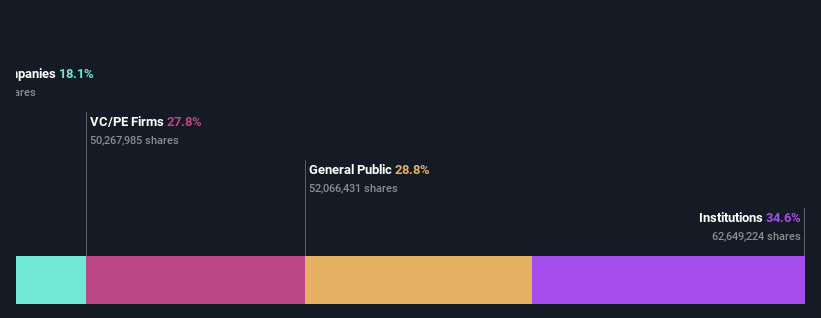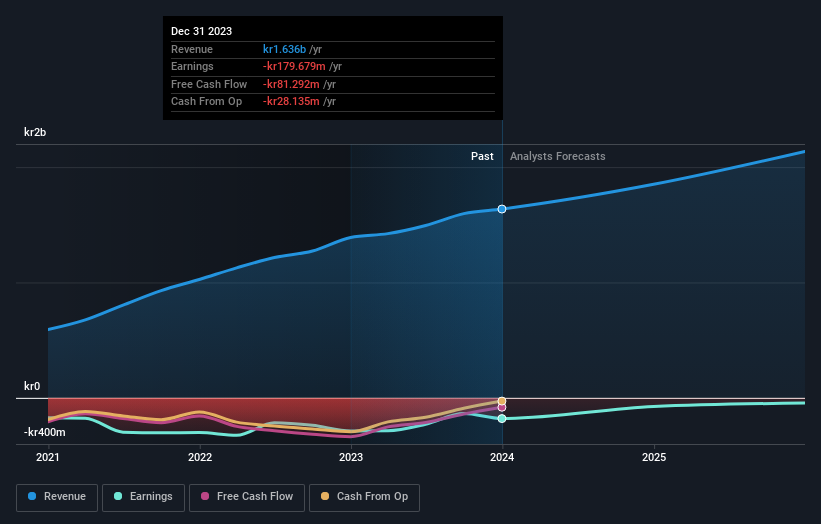Stock Analysis
- Sweden
- /
- Interactive Media and Services
- /
- OM:ACAST
Institutional investors are Acast AB (publ)'s (STO:ACAST) biggest bettors and were rewarded after last week's kr244m market cap gain

Key Insights
- Given the large stake in the stock by institutions, Acast's stock price might be vulnerable to their trading decisions
- A total of 5 investors have a majority stake in the company with 57% ownership
- Recent purchases by insiders
Every investor in Acast AB (publ) (STO:ACAST) should be aware of the most powerful shareholder groups. The group holding the most number of shares in the company, around 35% to be precise, is institutions. That is, the group stands to benefit the most if the stock rises (or lose the most if there is a downturn).
Last week’s 14% gain means that institutional investors were on the positive end of the spectrum even as the company has shown strong longer-term trends. The one-year return on investment is currently 59% and last week's gain would have been more than welcomed.
Let's take a closer look to see what the different types of shareholders can tell us about Acast.
See our latest analysis for Acast

What Does The Institutional Ownership Tell Us About Acast?
Institutional investors commonly compare their own returns to the returns of a commonly followed index. So they generally do consider buying larger companies that are included in the relevant benchmark index.
Acast already has institutions on the share registry. Indeed, they own a respectable stake in the company. This can indicate that the company has a certain degree of credibility in the investment community. However, it is best to be wary of relying on the supposed validation that comes with institutional investors. They too, get it wrong sometimes. If multiple institutions change their view on a stock at the same time, you could see the share price drop fast. It's therefore worth looking at Acast's earnings history below. Of course, the future is what really matters.

We note that hedge funds don't have a meaningful investment in Acast. Bonnier Ventures is currently the company's largest shareholder with 14% of shares outstanding. Meanwhile, the second and third largest shareholders, hold 13% and 11%, of the shares outstanding, respectively.
Our research also brought to light the fact that roughly 57% of the company is controlled by the top 5 shareholders suggesting that these owners wield significant influence on the business.
While it makes sense to study institutional ownership data for a company, it also makes sense to study analyst sentiments to know which way the wind is blowing. There is a little analyst coverage of the stock, but not much. So there is room for it to gain more coverage.
Insider Ownership Of Acast
While the precise definition of an insider can be subjective, almost everyone considers board members to be insiders. The company management answer to the board and the latter should represent the interests of shareholders. Notably, sometimes top-level managers are on the board themselves.
I generally consider insider ownership to be a good thing. However, on some occasions it makes it more difficult for other shareholders to hold the board accountable for decisions.
Our data suggests that insiders own under 1% of Acast AB (publ) in their own names. However, it's possible that insiders might have an indirect interest through a more complex structure. It appears that the board holds about -kr189m worth of stock. This compares to a market capitalization of kr2.1b. Many investors in smaller companies prefer to see the board more heavily invested. You can click here to see if those insiders have been buying or selling.
General Public Ownership
The general public, who are usually individual investors, hold a 29% stake in Acast. While this size of ownership may not be enough to sway a policy decision in their favour, they can still make a collective impact on company policies.
Private Equity Ownership
Private equity firms hold a 28% stake in Acast. This suggests they can be influential in key policy decisions. Sometimes we see private equity stick around for the long term, but generally speaking they have a shorter investment horizon and -- as the name suggests -- don't invest in public companies much. After some time they may look to sell and redeploy capital elsewhere.
Private Company Ownership
It seems that Private Companies own 18%, of the Acast stock. It's hard to draw any conclusions from this fact alone, so its worth looking into who owns those private companies. Sometimes insiders or other related parties have an interest in shares in a public company through a separate private company.
Next Steps:
I find it very interesting to look at who exactly owns a company. But to truly gain insight, we need to consider other information, too. Take risks for example - Acast has 1 warning sign we think you should be aware of.
Ultimately the future is most important. You can access this free report on analyst forecasts for the company.
NB: Figures in this article are calculated using data from the last twelve months, which refer to the 12-month period ending on the last date of the month the financial statement is dated. This may not be consistent with full year annual report figures.
Valuation is complex, but we're helping make it simple.
Find out whether Acast is potentially over or undervalued by checking out our comprehensive analysis, which includes fair value estimates, risks and warnings, dividends, insider transactions and financial health.
View the Free AnalysisHave feedback on this article? Concerned about the content? Get in touch with us directly. Alternatively, email editorial-team (at) simplywallst.com.
This article by Simply Wall St is general in nature. We provide commentary based on historical data and analyst forecasts only using an unbiased methodology and our articles are not intended to be financial advice. It does not constitute a recommendation to buy or sell any stock, and does not take account of your objectives, or your financial situation. We aim to bring you long-term focused analysis driven by fundamental data. Note that our analysis may not factor in the latest price-sensitive company announcements or qualitative material. Simply Wall St has no position in any stocks mentioned.
About OM:ACAST
Acast
Acast AB (publ) operates as a podcasting company in Europe, North America, and internationally.
Flawless balance sheet and fair value.

